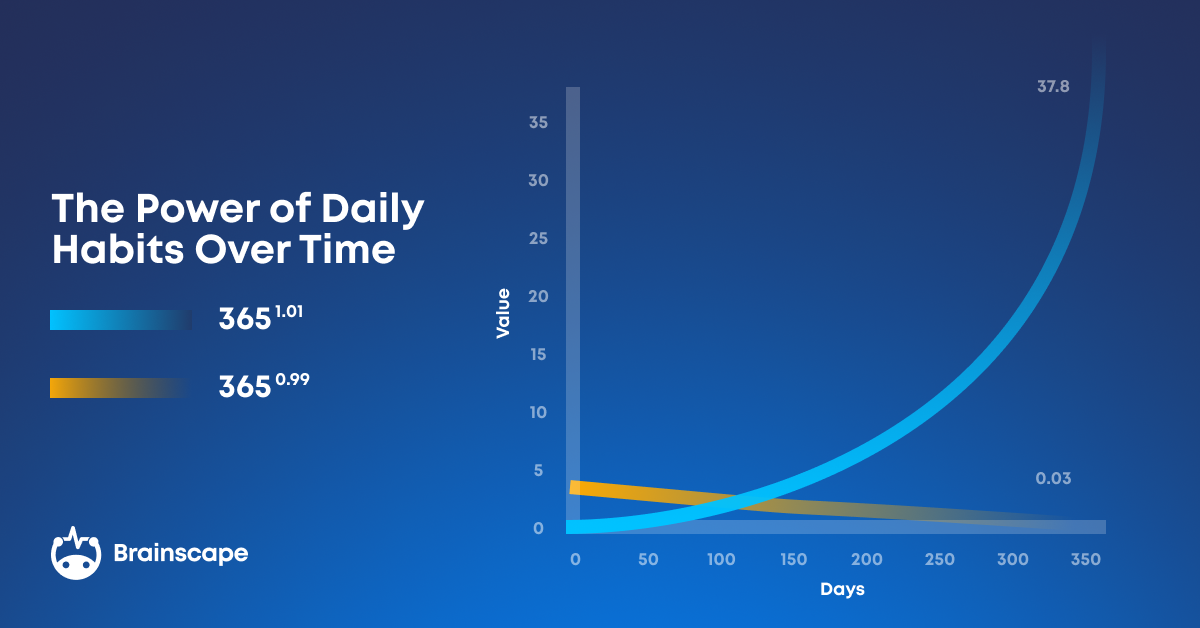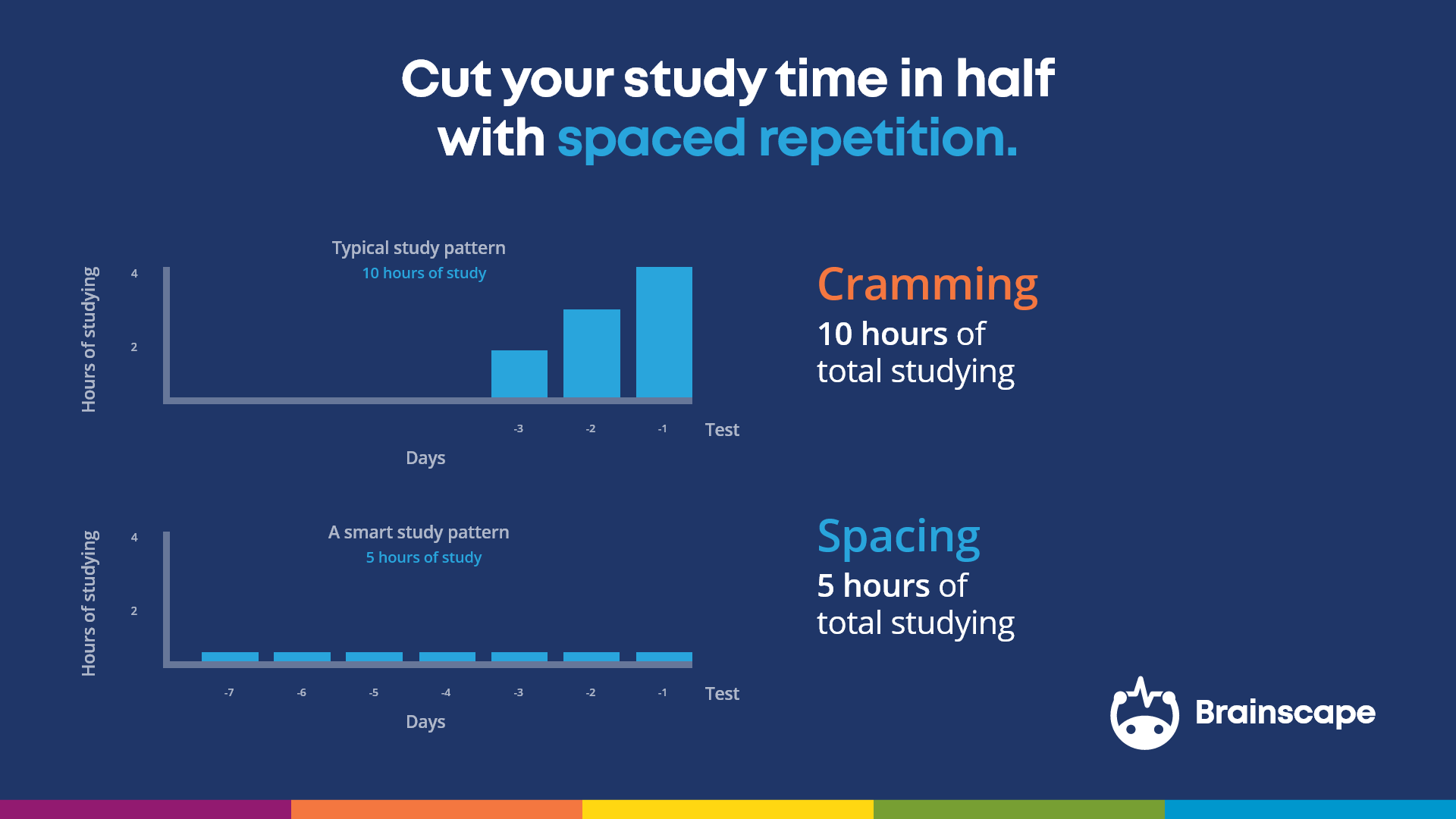If your habits don't line up with your dreams, then you need to either change your habits or change your dreams ― John C. Maxwell
Like a college student swearing off tequila after their first brutal hangover, we all promise we’ll never procrastinate again. And yet… here we are.
It’s the classic student lament: “If only I’d started studying sooner, I wouldn’t be in this mess!”
Well, I have good news for you. Studying effectively doesn't have to be hard!
The secret is building strong study habits.
Habits are grooves carved into your brain’s neural network that eventually become hard-wired, like tracks for a train. Once studying becomes a habit, instead of your brain trudging along muddy, hillocky paths, pushing aside thorny bushes, and stepping in cowpats, you glide along smooth rails, getting your study done easily so you can go out and play.
Once an action becomes habitual, it takes far less effort for your brain to accomplish it.
Once you’ve made studying daily a rock-solid habit, you’ll reap the rewards. Daily practice plays to your memory’s strengths, so you’ll be able to get knowledge solidly into your brain with less effort.
However, there are a series of enemies blocking your path:
If you want to become a study master and cruise smoothly through each learning session, you will need to disarm these enemies and use their weapons against them.
We've given you 11 tips on how to do that:
- Anchor new habits to old ones
- Start one micro-habit at a time
- Keep the chain going
- Bribe yourself to study
- Discover your best time to study
- Use peer pressure to study better
- Combat the forces of FOMO
Are you ready to enter the dojo and build strong daily study habits? Then welcome, young padawan. It’s time to learn the ways of the study master.
Psst. Did you know you can use the Brainscape app to achieve your personal growth goals—like improving your health, wealth, mindset, emotional intelligence, etc.?
1. The Enemies of Good Study Habits
The secret to study motivation? You need both offense and defense. That means shutting down distractions and getting your brain to actually do the work.
Think of your brain as a messy council. Sometimes, the long-term planner (your frontal cortex) wins the vote, and you power through a study session. Other times, the lizard brain takes over, hijacking your focus for Netflix, naps, and just one more TikTok scroll.
The problem? For most people, the frontal cortex is running a weak minority government. And the opposition—lobbied by dopamine-packed distractions—has way more influence. If you want to actually get stuff done, you’ve got to tilt the odds in your favor.
So now, you’re about to learn which obstacles are in the way of building your study habits and how to defeat them. Let’s get started ...
1.1. FOMO: The Social Trap
You know you should study, but then a friend texts: "Just one quick coffee?" And suddenly, your whole day is derailed.
Instead of relying on sheer willpower, schedule study time in advance and treat it like a non-negotiable event. That way, you can still say “yes” to fun—after the work is done.
1.2. Your Brain Is Lazy (And That’s Normal)
Your brain is an energy hog. It’s only 2% of your body weight but burns 20% of your energy—so naturally, it tries to conserve resources whenever possible.
That means when faced with mentally demanding tasks like studying, your brain looks for the easy way out. You’re biologically wired to avoid effort unless absolutely necessary.
The trick? Lower the barrier to entry. Set up your study space ahead of time, remove distractions, and make it so easy to start that your brain can’t say no. Once you get going, inertia will carry you forward.
Apps like Brainscape remove the organization and guesswork of figuring out what to study so you can learn with one tap. This conserves precious brain energy for improved learning AND makes you more likely to study!
1.3. Procrastination: The Illusion of Productivity
Ever noticed how your apartment is never cleaner than when you have an exam coming up? Procrastination loves disguising itself as productivity.
This is thanks to delay discounting—your brain prioritizes immediate, small rewards (like scrolling TikTok or organizing your sock drawer) over big, delayed rewards (like acing your test).
To outsmart your brain, turn studying into a game:
- Use a Pomodoro timer to create urgency.
- Set up a rewards system (snack break after 30 minutes!)
- Use adaptive flashcards (like Brainscape!) so you're always just challenged enough to stay engaged.
1.4. Instant Gratification: The Marshmallow Problem
In the 1960s, researchers tortured four-year-olds (for science!) by placing a marshmallow in front of them and promising two marshmallows later if they didn’t eat it right away.
The kids who resisted temptation grew up to be more successful students, healthier, and happier in relationships. Why? Because delayed gratification is the secret to long-term success.
The problem is, you’re not a four-year-old staring at a marshmallow. You’re a student constantly bombarded with instant rewards—social media, video games, and dopamine-packed distractions.
So how do you actually stay on track?
- Automate discipline—schedule study sessions so you don’t have to "decide" to study.
- Use structured breaks—short, guilt-free rests keep you from burning out.
- Reduce decision fatigue—stick to a routine so willpower isn’t constantly drained.
Each time you put off something easy to do something hard, you’re using your willpower. It turns out that willpower is a limited resource and gets exhausted the more you use it.
That’s why if you try to study daily without a specific plan, it’s much more likely not to get done. Then you end up like everyone else: only studying when a test is looming closer, under the tyranny of an impending deadline.
Cramming is an ineffective way to study, which is why (as you’ll find out soon) distraction is an enemy you will need to vanquish to build strong study habits.
2. Strong Study Habit Tips to Defeat Your Enemies

By now, you’ve probably realized that "strong study habits" are just code for "having the willpower to do a little work every day so you don’t have to suffer through an all-nighter later."
The truth is, small daily efforts compound into exponential gains—while slacking off every day leads to last-minute cramming, stress, and the academic equivalent of hitting the reset button on your brain.
But here’s the good news: you don’t need superhuman discipline. You can actually hack your brain to make studying feel effortless.
Below, we’ll show you some mental jiu-jitsu techniques to outmaneuver distractions, sidestep procrastination, and make studying way less painful.
Tip 1. Anchor New Habits to Old Ones
Our brains don’t like to spend lots of energy on hard work. But a habit doesn’t take energy or willpower; it runs on autopilot.
The easiest way to make a new habit is to tie it into an existing habit that is already established (otherwise known as an anchor habit).
For example, if you study better in the morning and you already have a coffee every day. Bring your notes to the coffee shop and do your study session there. The first coffee is your anchor habit, and studying is the new habit you’re attaching to it. Soon, it will become automatic.
If evenings are your chosen study time, then build your habit on something you do every evening. For example, you could spend an hour studying every night after dinner, or you could work through your notes before you go to bed each night. Or you could use the Feynman Technique while you’re out walking, exercising, or commuting.
When you tie your new habit with an existing habit, you’re taking advantage of neural pathways that have already been laid down. With consistent practice, your new study habit should be effortless in a couple of weeks.
Tip 2. Start One Micro-Habit at a Time
One of the best ways to guarantee that your new habit won't stick is to take on too big of a challenge at once. So let's nip that one in the bud before we continue.
If your goal is to study every day instead of waiting until the last minute, don't start by promising yourself that you'll study for two hours a day or re-read 5 textbook chapters at a time. That can feel so daunting that you'll end up quitting the first time a major wave of inertia hits you.
Instead, maybe just commit to studying one 10-flashcard round in Brainscape every day or to making digital flashcards for just one small textbook lesson every day. Bite-sized milestones are easier targets for forming habits and staying motivated to study.
3. Keep the Chain Going

Apps from Duolingo to Brainscape to TikTok reward you for daily streaks. The fear of losing your daily habit is a powerful motivator.
You can use apps like Don’t Break the Chain or create a chain for your daily study habit, OR you can very simply set study reminders in Brainscape!
Go into the menu in the mobile app, select Notifications, and then toggle on Streak Reminders. Those will show up as push notifications on your phone’s home screen, reminding you to stop what you’re doing and put in a quick study round with Brainscape. You can also customize the time of day you’d prefer to receive your reminders!
Additionally, Brainscape's study metrics page will help you visualize your progress toward your goals.
4. Bribe Yourself to Study
So, the lizard brain is winning. It wants treats! Now!
Fine.
Let's give it what it wants.
You can train your brain like it’s one of Pavlov’s dogs. In his foundational experiment, Pavlov was able to connect two stimuli in a dog’s brain: the ringing of a bell and a bowl of delicious dog food. By the end of Pavlov’s experiment, the connection between the sound of the bell and a meal was so strong that his dogs would start to salivate when they heard the bell.
You need to make a connection between sitting down to study and something your brain likes.
It’s time to train your brain with gratification.
Every time you sit down to study, give yourself a treat. Whatever floats your particular boat: whether it’s chocolate or chips or coffee. Once you've studied at least 10-15 minutes, give yourself the treat.
Pretty soon, your brain will start to look forward to your study sessions because you’ll have connected the positive experience (the treat) with studying.
Congratulations! You have created a neural connection in your brain to tie studying together with the substance of your choice. You Pavlov'd yourself.
5. Discover Your Best Time to Study
We’re cyclical creatures, and keeping your study schedule regular will cement the habit much more strongly than shifting it around each day.
So when should you study? Are you a morning lark or a night owl?
Everyone has a circadian cycle of sleep and wakefulness. Paying attention to this cycle means you can go to study at times when your energy is optimal. To discover your cycle, spend a week observing yourself.
Take note of how the time you go to bed affects how you feel in the morning. This is important. Your circadian rhythm means you can get the same eight hours of sleep, but how rested you feel depends a lot on when during the night you take your rest.
Once you’ve worked out when you function best, note down those times. Use this knowledge to decide the best time for you to study.
6. Use Peer Pressure to Study Better
Peer pressure is a powerful force. It makes people do strange things, like wear clothes with brand logos on them or pay $14 for a side of fries.
One of Professor Robert Cialdini’s six powerful elements of human persuasion is a variant of this force. It’s called consistency, and you can use it to persuade yourself into good habits.
Here’s how consistency works. As human beings, we like to appear to be consistent with our fellow humans. So if we tell everyone, “I’m a party animal, and the only time I ever study is on the night before a test,” a precedent has been set.
To appear consistent with your peers, you can’t be found going over your lecture notes on a mid-term Wednesday evening.
However, if you tell all your friends about the wonders of studying every day, then you have a different kind of reputation to uphold.
Most people will expend far more effort to avoid embarrassment than they will to achieve a distant goal. Use this knowledge to create social pressure in support of the habits that will make you succeed in life.
Embrace your inner nerd, and ‘own’ the fact that you geek out at a set time each day. Anyone who makes fun of you will find the tables turned during finals week when they’re frantically trying to cram while you’re relaxed and confident with plenty of time for leisure, romance, and whimsy.

After a few months of daily studying, you’ll find your habits become a part of your identity. Once you see yourself as someone who studies every day, you’ve truly won the battle and created strong study habits.
7. Combat the Forces of FOMO
Move your phone to another room. Apps like Freedom and StayFocusd can do this for you on a laptop. You don't want to receive messages when studying. Ignorance is the best cure for FOMO—if you don’t know about the other things you could be doing, you can’t be distracted by them.
FAQ: How to Build Strong Study Habits
How do you develop good study habits?
Start small and stay consistent. Rather than overhauling your routine overnight, choose a manageable daily study task and anchor it to an existing habit (like spending ten minutes on your Brainscape flashcards after lunch). The key is consistency over intensity. Make studying automatic, not exhausting.
How can I focus 100% on studying?
To achieve deep focus, reduce mental clutter. That means eliminating distractions (like your phone), setting clear goals, and choosing study techniques that engage your brain, like active recall. Your environment and mindset matter just as much as the material.
What are the 5 effective study habits?
While there’s no universal list, here’s a list of 5 helpful study habits:
1. Spacing study sessions out over time (spaced repetition)
2. Testing yourself instead of just reviewing notes (active recall)
3. Breaking content into smaller parts
4. Studying at the same time each day
5. Tracking progress to stay motivated (by yourself or by using automated study trackers such as Brainscape)
How can I make my study strong?
Build a system that works for you. That includes knowing your energy cycles, setting realistic goals, using the right study tools, and sticking to routines. The strongest study practices aren’t about willpower. They’re about smart strategy and repetition.
A Final Word: Your Study System
We’ve now gone through the two parts of building a strong study habit: defense and offense. It’s time to put it all together.
Here are the habits that go into building a study system that will work for you.
- Choose an existing activity you habitually do at these times and tie it to your new study habit.
- Keep the chain going—maintain a record of your daily sessions and create an unbroken chain of them.
- Decide on your study treat and bribe yourself with it at the start and end of your session.
- Note the times of day when your brain is sharpest. Choose these as your designated study times.
- Start celebrating your inner nerd. Spread the gospel of daily study to your friends to create a consistent character you have to live up to.
- Push back against FOMO by turning off your phone and staying ignorant of what your friends are doing.
- Be unapologetic when ducking out of social events in order to keep your study habit.
Building strong study habits is ultimately about respecting yourself and your long-term goals. It can be as simple as committing to 5 minutes of Brainscape flashcards per day. Eventually, this will become easy and grow your attention span for longer study sessions.
Every time you keep your commitments, you’re building your willpower muscle. This isn't just about a test. You're building the most powerful skill for your entire life.
Additional Reading
- How to Study While Exercising
- How to create a study routine that maximizes productivity
- Finding Study Motivation When You Want to Procrastinate
Sources
Ayduk, O., Mendoza-Denton, R., Mischel, W., Downey, G., Peake, P. K., & Rodriguez, M. (2000). Regulating the interpersonal self: Strategic self-regulation for coping with rejection sensitivity. Journal of Personality and Social Psychology, 79(5), 776–792. https://doi.org/10.1037/0022-3514.79.5.776
Cialdini, R. (2016). Pre-suasion: A revolutionary way to influence and persuade. Simon & Schuster.
Doyle, J. R. (2013). Survey of time preference, delay discounting models. Judgment and Decision Making, 8(2), 116-135.
Gardner, B., & Rebar, A. L. (2019). Habit formation and behavior change. In Oxford Research Encyclopedia of Psychology.
Gailliot, M. T., Baumeister, R. F., DeWall, C. N., Maner, J. K., Plant, E. A., Tice, D. M., Brewer, L. E., & Schmeichel, B. J. (2007). Self-control relies on glucose as a limited energy source: Willpower is more than a metaphor. Journal of Personality and Social Psychology, 92(2), 325–336. https://doi.org/10.1037/0022-3514.92.2.325
Jarius, S., & Wildemann, B. (2015). And Pavlov still rings a bell: Summarising the evidence for the use of a bell in Pavlov’s iconic experiments on classical conditioning. Journal of Neurology, 262(9), 2177-2178. https://doi.org/10.1007/s00415-015-7858-5
Mischel, W., Ayduk, O., Berman, M. G., Casey, B. J., Gotlib, I. H., Jonides, J., ... & Shoda, Y. (2011). ‘Willpower’ over the life span: Decomposing self-regulation. Social Cognitive and Affective Neuroscience, 6(2), 252-256.
Seeyave, D. M., Coleman, S., Appugliese, D., Corwyn, R. F., Bradley, R. H., Davidson, N. S., ... & Lumeng, J. C. (2009). Ability to delay gratification at age 4 years and risk of overweight at age 11 years. Archives of Pediatrics & Adolescent Medicine, 163(4), 303-308.
